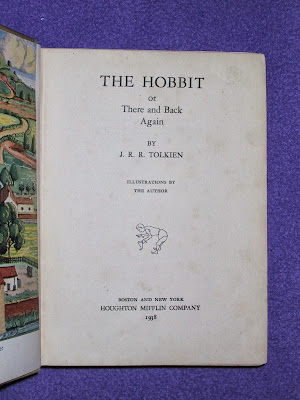In
the first chapter of The Lord of the Rings, Bilbo is about to reach the
age of eleventy-one, in, 'a rather curious number', and at his birthday
party, his announcement 'I am eleventy-one today' is met with cheers from the
assembled guests. In English there are other invented terms for
numbers representing tens, most famously umpty, which
is now almost forgotten, but on which was based the very common
word umpteen. It would be easy to see this as a
piece of whimsical fancy based on Lewis Carroll logic: if we can count to ninety, why
not eleventy?
But
as always with Tolkien, the roots go deeper, and are planted in
the reality of the culture of the ancient world. In Old English,
the next two tens after hund 'hundred' were hundendlufontig and hundtwelftig:
the hund- was a prefix, which also occurred in hundeahtatig 'eighty'
and hundnigontig 'ninety'; if we remove the prefix,
we get -endlufontig 'eleventy' from endlufon or endleofon 'eleven' and -twelftig
'twelfty'. Why did the Anglo-Saxons count up
to 'twelfty'? The answer lies in an ancient system of counting in twelves; much later, at the end of the Middle
English period, certain commodities,
such as fish, were counted in 'hundreds' that actually contained six score or 120, and this was known as the 'great hundred' or 'long hundred' (OED: hundred n. and a., sense
3). That this probably goes back to
ancient times is shown by the fact that
in Old Norse 100 was tiu tigir'ten tens', 110 was ellifu tigir 'eleven
tens' (exactly parallel to eleventy),
and 120 was hundrad 'hundred'. There are even said to be
ordinal numerals titugandi and ellifu-tugandi 'tentieth' and
'eleventieth'.
Similarly, the OED
shows that, from around 1400, many commodities
were reckoned by the gross (OED: gross n.3),
which signified 12 dozen (144).
We know that the hobbits used this reckoning from another place in the
same chapter, where we are told that the invitations
to the special family dinner party were limited to twelve dozen, 'a
number also called by the hobbits one Gross, though the word was not considered proper to use of people' — Bilbo offends his guests later in the speech already referred
to, by doing just that. The party is even punningly described as 'an
engrossing entertainment', although the
sentence containing this phrase no longer contains the mention of '144' present in the early draft (HMEVl. 23),
so many readers miss the pun.
Tolkien is imagining,
as with many other matters, that the hobbits continued a practice used by our
forefathers. But he presumably also knew
that the OED has an entry for the similarly formed word eleventeen meaning
'twenty-one', which was used by a 17th-century writer named George
Wither (and also revived in a Victorian
farce by Charles Selby in 1858}. It is also quite probable that he had come across this gloss for the Icelandic word ellefu-tiu
in Cleasby and Vigfusson's Icelandic-English
Dictionary (1874): '"eleventy"
(i.e. one hundred and ten),,..frequent in reckoning by duodecimal
hundreds'.
The Ring of Words
(OUP 2006)






















